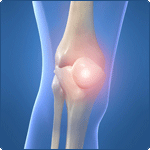Medial Collateral Ligament (MCL) Injuries
 The MCL is one of the four major ligaments of the knee. It connects the femur (thigh bone) to the tibia (shin bone) along the inside of the knee. Along with the other ligaments in your knee joint, the MCL provides stability in your knee when running, walking, and performing other physical activities that involve your legs. A MCL injury typically means that you have an MCL tear, and is often diagnosed with injuries to other areas of the knee.
The MCL is one of the four major ligaments of the knee. It connects the femur (thigh bone) to the tibia (shin bone) along the inside of the knee. Along with the other ligaments in your knee joint, the MCL provides stability in your knee when running, walking, and performing other physical activities that involve your legs. A MCL injury typically means that you have an MCL tear, and is often diagnosed with injuries to other areas of the knee.
Causes of MCL Injuries
The most common cause of an MCL injury is when the knee is hit on the outside, such as when a football player is tackled. This can cause the MCL (located on the inside of the knee, closer to your other leg) to overstretch and tear. An MCL tear usually occurs during a landing, and can also be injured when landing after a jump.
Symptoms of a Torn MCL
Like with most knee injuries, a torn MCL is associated with pain and swelling around the knee joint. The knee may also feel like it is catching or locking when moving. In more severe injuries, patients may experience knee instability or buckling during activity.
How to Treat a Torn MCL
If you think you are suffering from a torn MCL it’s best to check with your doctor. Often immediate course of action following a torn MCL includes the RICE method of rest, ice, compression, and elevation. Physical activity should be limited until the pain and swelling go away. Anti-inflammatory pain relievers such as ibuprofen or aspirin can also be used to help reduce symptoms.
Wearing an MCL knee brace is often recommended by a physician to help support the knee while recovering. These knee braces have hinges that help support the knee when bending. MCL tear braces can also be worn before or after recovery to prevent knee injuries.
Luckily, most MCL injuries heal on their own and surgery is typically not recommended. If you have a severe knee injury, consult your physician for the best course of action. Even if surgery is not requires, physical therapy may be recommended to help strengthen the muscles around that knee that provide stability.




